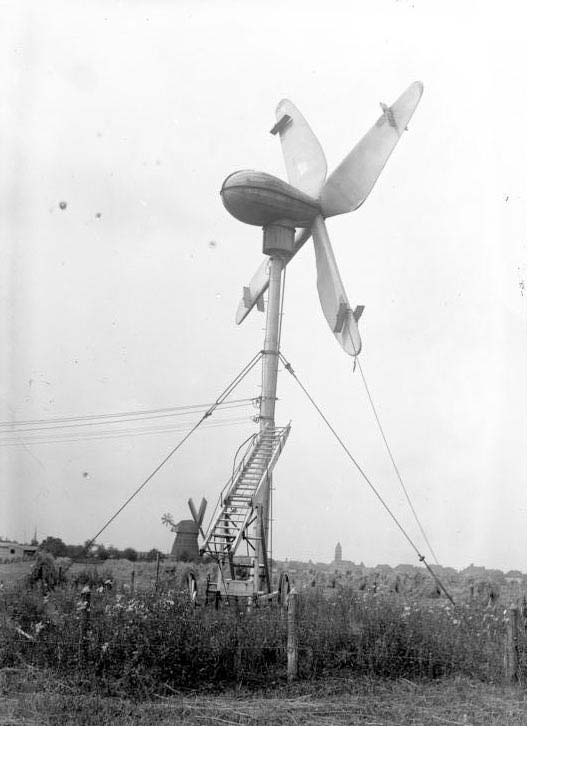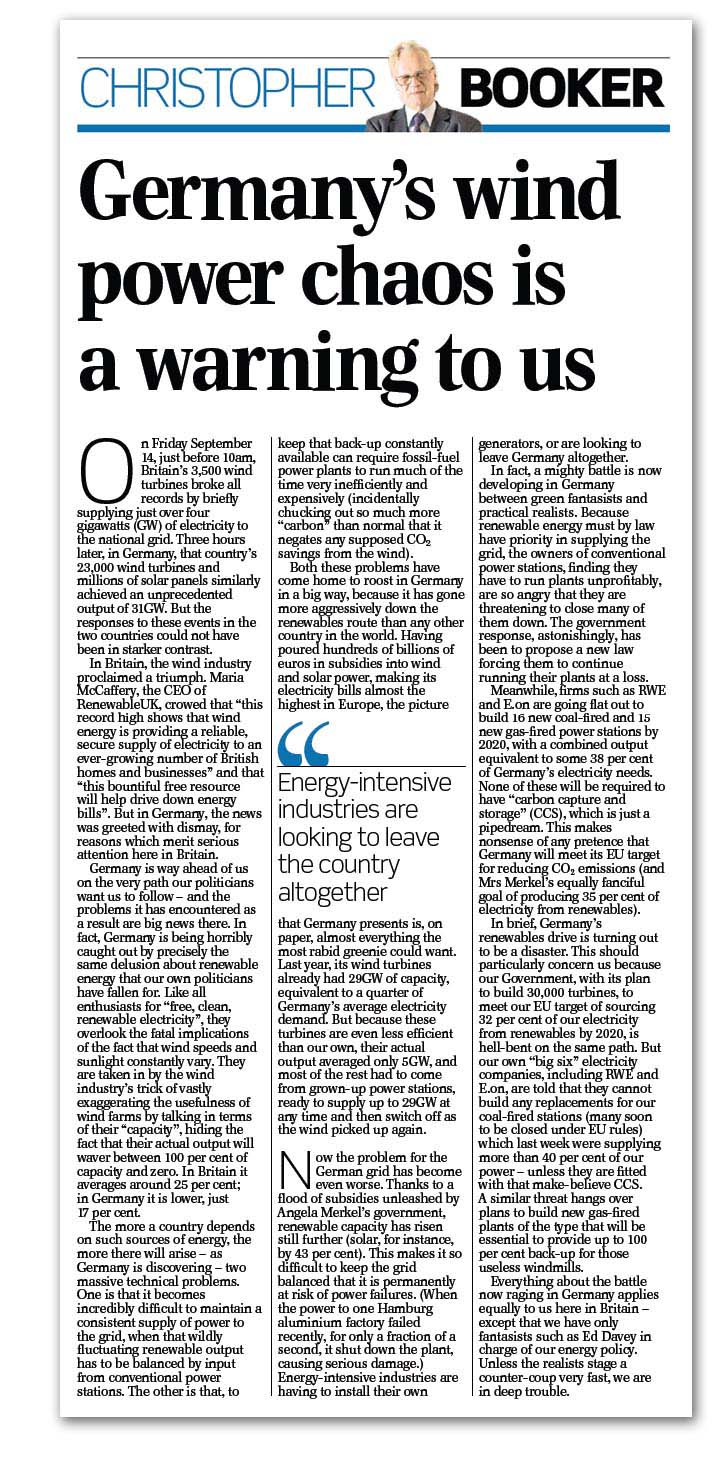Booker: Germany's wind power chaos
Sunday 23 September 2012
 For reasons unspecified, Germany was an early pioneer of wind generation. The photograph shows a wind turbine commissioned in August 1932, just before Hitler came to power, the caption telling us: "Electricity from the air, by means of a wind wheel! The wind turbine which is placed in an open space in Berlin, produced electricity by the rotation of the propeller. The tests are a complete success". For reasons unspecified, Germany was an early pioneer of wind generation. The photograph shows a wind turbine commissioned in August 1932, just before Hitler came to power, the caption telling us: "Electricity from the air, by means of a wind wheel! The wind turbine which is placed in an open space in Berlin, produced electricity by the rotation of the propeller. The tests are a complete success".However, even though the UK has now caught the wind disease, Germany is still way ahead. Together with solar, it has gone further down the "renewables" path than any country in the world. Thus, while on Friday, 14 September, just before 10am, Britain's 3,500 wind turbines broke all records by briefly supplying just over four gigawatts (GW) of electricity to the national grid, three hours later, in Germany (as we had fun recording), that country's 23,000 wind turbines and millions of solar panels achieved their own record - an unprecedented output of 31.5GW. But, as Booker records in this week's column, the responses to these events in the two countries could not have been in starker contrast. In Britain, the wind industry proclaimed a triumph. Maria McCaffery, the CEO of RenewableUK, crowed that "this record high shows that wind energy is providing a reliable, secure supply of electricity to an ever-growing number of British homes and businesses" and that "this bountiful free resource will help drive down energy bills". But in Germany, the news was greeted with dismay, for reasons which merit serious attention here in Britain. Germany is way ahead of us on the very path our politicians want us to follow – and the problems it has encountered as a result are big news there. In fact, Germany is being horribly caught out by precisely the same delusion about renewable energy that our own politicians have fallen for.  Like all enthusiasts for "free, clean, renewable electricity", he writes, they overlook the fatal implications of the fact that wind speeds and sunlight constantly vary. They are taken in by the wind industry's trick of vastly exaggerating the usefulness of wind farms by talking in terms of their "capacity", hiding the fact that their actual output will waver between 100 percent of capacity and zero. In Britain it averages around 25 percent; in Germany it is lower, just 17 percent. Like all enthusiasts for "free, clean, renewable electricity", he writes, they overlook the fatal implications of the fact that wind speeds and sunlight constantly vary. They are taken in by the wind industry's trick of vastly exaggerating the usefulness of wind farms by talking in terms of their "capacity", hiding the fact that their actual output will waver between 100 percent of capacity and zero. In Britain it averages around 25 percent; in Germany it is lower, just 17 percent.The more a country depends on such sources of energy, the more there will arise – as Germany is discovering – two massive technical problems. One is that it becomes incredibly difficult to maintain a consistent supply of power to the grid, when that wildly fluctuating renewable output has to be balanced by input from conventional power stations. The other is that, to keep that back-up constantly available can require fossil-fuel power plants to run much of the time very inefficiently and expensively (incidentally chucking out so much more "carbon" than normal that it negates any supposed CO2 savings from the wind). Both these problems have come home to roost in Germany in a big way, because it has gone more aggressively down the renewables route than any other country in the world. Having poured hundreds of billions of euros in subsidies into wind and solar power, making its electricity bills almost the highest in Europe, the picture that Germany presents is, on paper, almost everything the most rabid greenie could want. Last year, its wind turbines already had 29GW of capacity, equivalent to a quarter of Germany’s average electricity demand. But because these turbines are even less efficient than our own, their actual output averaged only 5GW, and most of the rest had to come from grown-up power stations, ready to supply up to 29GW at any time and then switch off as the wind picked up again. Now the problem for the German grid has become even worse. Thanks to a flood of subsidies unleashed by Angela Merkel's government, renewable capacity has risen still further (solar, for instance, by 43 percent). This makes it so difficult to keep the grid balanced that it is permanently at risk of power failures. (When the power to one Hamburg aluminium factory failed recently, for only a fraction of a second, it shut down the plant, causing serious damage.) Energy-intensive industries are having to install their own generators, or are looking to leave Germany altogether. In fact, a mighty battle is now developing in Germany between green fantasists and practical realists. Because renewable energy must by law have priority in supplying the grid, the owners of conventional power stations, finding they have to run plants unprofitably, are so angry that they are threatening to close many of them down. The government response, astonishingly, has been to propose a new law forcing them to continue running their plants at a loss. Meanwhile, firms such as RWE and E.on are going flat out to build 16 new coal-fired and 15 new gas-fired power stations by 2020, with a combined output equivalent to some 38 percent of Germany's electricity needs. None of these will be required to have "carbon capture and storage" (CCS), which is just an empty pipedream. This makes nonsense of any pretence that Germany will meet its EU target for reducing CO2 emissions (and Mrs Merkel's equally fanciful goal of producing 35 percent of electricity from renewables). In brief, Germany's renewables drive is turning out to be a disaster. This should particularly concern us because our Government, with its plan to build 30,000 turbines, to meet our EU target of sourcing 32 per cent of our electricity from renewables by 2020, is hell-bent on the same path. But our own "big six" electricity companies, including RWE and E.on, are told that they cannot build any replacements for our coal-fired stations (many soon to be closed under EU rules) which last week were supplying more than 40 percent of our power – unless they are fitted with that make-believe CCS. A similar threat hangs over plans to build new gas-fired plants of the type that will be essential to provide up to 100 percent back-up for those useless windmills. Everything about the battle now raging in Germany, Booker concludes, applies equally to us here in Britain – except that we have only fantasists such as Ed Davey in charge of our energy policy. Unless the realists stage a counter-coup very fast, we are in deep trouble. COMMENT THREAD Richard North 23/09/2012 |
EU Referendum: foundering Farage
Saturday 22 September 2012
Predictably, though, the Spectator is less than impressed, accusing a "Floundering Farage" of struggling a little once "away from his hobby horse of a European Union Referendum". But, had the magazine been on the ball, it could have observed that Farage was struggling even when riding his hobby horse. That is the only conclusion one can draw from his "Referendum Stitch-Up" pamphlet. His knowledge about the mechanics if the EU was always slight, but in this production he demonstrates that he has not added significantly to his knowledge in the ten years since I worked across a desk from him. If this was simply a matter of a vainglorious party leader doing what politicians so often do – displaying his ignorance – it would not matter so much. But, as even the Spectator concedes, we are almost certainly looking at a referendum in the not too distant future. Rigged though it may be – and we could hardly expect otherwise – I have to believe that this referendum is winnable, and that we can successfully deliver a "withdraw from the EU" message to our masters. With contributions such as Farage's, though, we are set to lose. To understand why, it is helpful to go back to the debate we were having on Article 50, where we argued that we need to take advantage of the negotiation process offered to draw up a relationship with the EU before finally cutting the knot. Amongst those who disagreed with this stance was Nigel Farage, one of many who believe that we can unilaterally abrogate the treaties and then expect the "colleagues" to sit down and negotiate with us, without there being any penalty from such action. Until now, quite how Farage managed to believe that this could be a penalty-free option has escaped me. But, if it is his settled belief that a free trade area can be set up with "a blank piece of paper", then it is unsurprising that he sets such little store on negotiation - there is only a blank sheet of paper to agree. And that attitude is what is going to lose us the referendum. The reason why this will happen is because Farage and his supporters are preparing, in an utterly cavalier fashion, to ditch the "single market", that iconic property which legend has it was breathed into life by the Dragon Queen herself, Margaret Thatcher. Yet, examine David Cameron's rhetoric on the European Union and you will notice the emphasis is almost entirely on preserving this mythical beast. To threaten it with extinction is to invite unrestrained enmity from the entire Tory tribe and give hostage to fortune to the other side. And that is only part of it. The "single market" effectively comprises a huge body of EU law – directives, regulations and decisions – alongside thousands of meticulously crafted standards, which together binds the corporate world and protects it from the cold winds of competition, mainly from small and medium businesses. Anyone who believes that big business doesn't like regulation simply knows nothing about big business. As noted in our forum, "complex regulatory structures are a significant barrier to entry, and dominant firms that can afford large compliance departments often lobby for such regulation which prevents the entry of upstart firms". And, in their enthusiasm for more and more law, the corporates are the natural partners to the EU. If their precious body of law is threatened by a "no" vote in a referendum, they will pour massive funding into any "yes" campaign. The best we can possibly hope for from the corporates is their neutrality, which could only be secured – of at all – by assurances that their "single market" is kept intact. On the other hand, the genius of the EU is the way it has hijacked trade regulation and harnessed it in the service of political integration. In promoting our exit from the EU, therefore, we have to detach the corpus of standards and trade agreements from the community acquis and give it an independent identity. This, to my mind, is one of the greatest challenges confronting the "outers" in any referendum campaign. It is also one I believe we can deal with by negotiating continued EEA membership – thus keeping the single market intact for at the very least a transitional period, while we sort out better, long-term arrangements. Whatever might actually be decided though, we cannot afford to ignore the single market, or the rent-seekers who gain so much benefit from it. Allowing a "floundering Farage" to set the pace here would then be to invite a foundering campaign. Protect the single market, or we lose. COMMENT: "FIGHTING THE GOOD FIGHT" THREAD Richard North 22/09/2012 |
Sunday, 23 September 2012
Posted by
Britannia Radio
at
10:26
![]()























